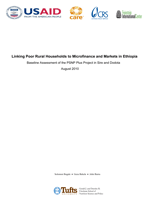This report presents the results from a baseline assessment of the PSNP Plus project in Sire and Dodota woreda’s in the Oromiya region of Ethiopia.
These assessments are part of a broader longitudinal impact study of the PSNP Plus project, which targets poor, rural households in food insecure areas that benefit from the Productive Safety Net Program (PSNP). The goal of PSNP Plus is to move households towards graduation from PSNP through market-driven approaches to diversify their livelihoods, build assets and link to financial services and markets.
The PSNP Plus project started in the last quarter of 2008 and aims to link PSNP participants to both formal microfinance and (in the interim or absence of this) to informal microfinance by establishing Savings and Internal Lending Communities (SILC). The project also attempts to link PSNP households to markets through the development of different types of commodity value chains. The PSNP Plus project in Sire and Dodota is supporting four value chains; cereals, white pea beans, honey and small ruminant fattening. This study specifically focused on collecting data on income and assets of households participating in the projects cereal and livestock value chains. This baseline will be used for assessing the impact of the project against these indicators during a final impact assessment in 2011.







